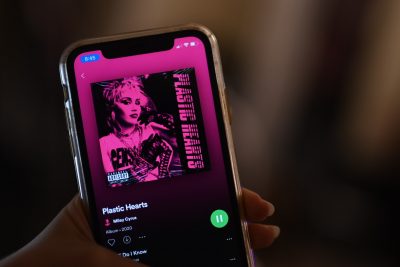“Plastic Hearts,” released Friday, represents a return to form for Miley Cyrus.

For the past decade, she had cycled genres between albums — from the hip-hop stylings on 2013’s “Bangerz” to the boring psychedelia of 2015’s “Miley Cyrus & Her Dead Petz” to the disappointingly average country sounds on 2017’s “Younger Now.”
In 2020, it seems Cyrus has settled into a matured version of her initial pop rock sound on her debut album, “Breakout,” and the artist wears her musical influences on her sleeve.
Throughout the album, Cyrus proudly displays her affection for classic rock and pop through artist features on multiple tracks. While her reliance on older genre tropes may come across as unoriginal to some, Cyrus’s charismatically raspy voice elevates the songs from cheap imitation to charming admiration while maintaining her own identity as an artist.
“Midnight Sky,” for instance, is heavily inspired by the song “Edge of Seventeen” by Stevie Nicks, whose lyrics and vocals appear on Cyrus’s “Edge of Midnight.”
“Midnight Sky” reflects Cyrus’s freedom after her divorce from actor Liam Hemsworth, adding real-life catharsis to an already haunting vocal performance in the chorus. Cyrus belts, “I was born to run, I don’t belong to anyone / I don’t need to be loved by you,” which, accompanied by glistening synths and energized percussion, gives an exciting sense of urgency to her freewheeling identity.
Other songs on the album contain nearly outright samples of other iconic songs. She collaborates with Dua Lipa on “Prisoner,” sampling “Physical” by Olivia Newton-John, and the track “Gimme What I Want” has a bassline eerily similar to the one found on Nine Inch Nails’ “Closer.”
“Gimme What I Want” is another album highlight, with the griminess of that bassline giving Miley’s rasp added heft that lends the assertiveness of the song’s message — she doesn’t need someone’s love to thrive, so if her lover can’t satisfy her, she’ll be more than okay on her own.
Cyrus had previously adapted Nine Inch Nails on her song, “On A Roll,” which was featured on the Netflix show “Black Mirror,” but it comes as no surprise that, on an album filled with references to older works, she would lift from Nine Inch Nails once again.
Meanwhile, on “Prisoner,” Cyrus and Lipa sing about inner conflict within a relationship. The sampling of “Physical” is brilliant — Cyrus takes its theme of intimacy and, by employing that song’s melody in the newer song, gives Newton-John’s song new meaning. Lipa and Cyrus’ raspy voices harmonize seamlessly, giving the song a cohesiveness that’s often lost in star-studded pop collaborations, and these vocals complement the song’s buttery bassline.
“Night Crawling” is another instance of old meeting new. Thanks in part to Billy Idol’s lower register on the track, which harmonizes well with Cyrus’s own punk-adjacent alto voice, the song oozes ’80s pseudo-horror charm akin to Michael Jackson’s “Thriller” and Rockwell’s “Somebody’s Watching Me.” The guitar strums in the chorus are unique to modern pop music.
Similarly, “Bad Karma” emits an ominous ’80s rocker vibe through Joan Jett’s creepy yet catchy moans throughout, accentuating the hard-hitting hums of the guitar. Cyrus defiantly sings about being a rebel in the moment through lines such as, “I don’t give a f—, I don’t believe in luck / I do what I wanna do.”
Rebellion seems to be a constant throughout Cyrus’s career, whether it’s the initial tone shift she had with “Can’t Be Tamed,” the controversy behind music videos like “We Can’t Stop” and “Wrecking Ball” or the general drug-laden boldness behind songs like “Dooo It!”
Despite this, the songs themselves never felt authentic enough to pay much attention to. At least, not until “Plastic Hearts.”




